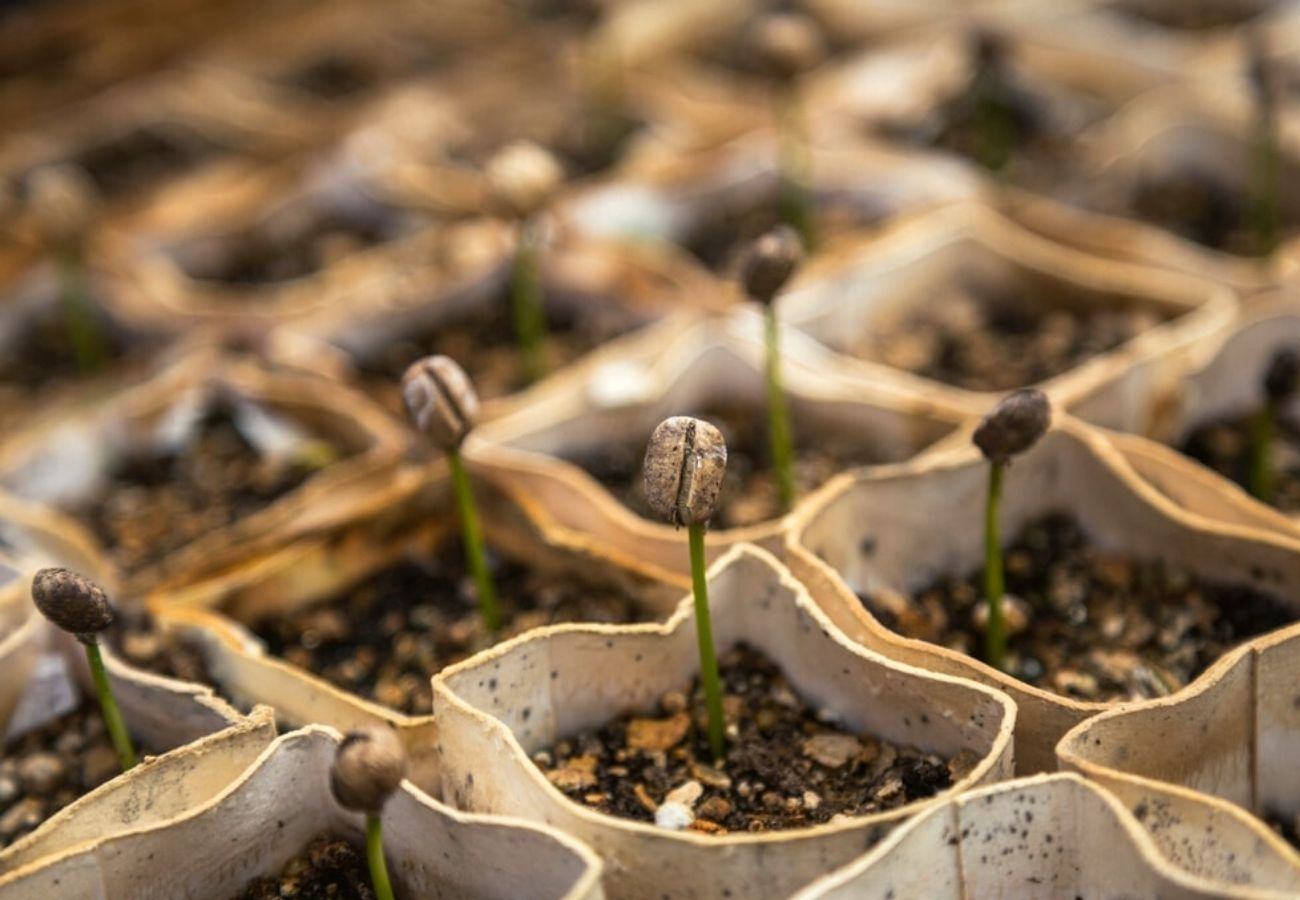
Coffee has long achieved heights beyond simply being an enjoyable beverage. Coffee lovers and enthusiasts are forever seeking new improvements and innovations for their favorite drink. This, in turn, is making coffee producers strive harder.
Are you looking for a coffee that is not only delicious but also healthy? Contrary to popular belief, these two parallels are indeed possible. Make way for coffee! What is it? Read on to find all about coffee.
In this article, you will learn
- What is Organic Coffee?
- What to look for in Organic Coffee?
- Organic Coffee vs. Conventional Coffee
- Why Switch to Organic Coffee?
- How to Choose the Right Organic Coffee Beans?
Organic coffee is essentially coffee that is grown without the use of any chemicals. Many agrochemicals, fertilizers, pesticides, insecticides, and more can be used during regular coffee cultivation. However, in coffee production, organic alternatives such as compost and coffee pulp have been used.
Also, prefer specific standards for the location of coffee farms. Located in sustainable areas that are less affected by changes in the weather. It thrives in lush regions with a rich density of natural flora and fauna. This, in turn, helps in the preservation of forests.
This, however, is not the only factor contributing to the “organic” tag attached to these coffee beans. Not only the growing and harvesting but even the roasting and shipping should strive to be organic. It includes processes such as the addition of food coloring, additives, preservatives, and more.
Regulations for the handling and processing are set by the Organic Food Production Act of 1990 (OFPA). The USDA (United States Department of Agriculture) also sets standards regarding coffee beans’ harvesting.
According to it, no chemical pesticides should have been used in a particular area for at least three years before harvesting the coffee beans.
Ever wondered how is coffee made? The process of making organic decaf involves two methods, solvent-based, while the other is not.
The two most commonly used solvents are methylene chloride and ethyl acetate. Both of these chemicals evaporate when the coffee beans are roasted.
Ethyl acetate is considered the more organic of the two options. This is because it is naturally produced by fruits when they ripen. However, it is often produced artificially to reduce costs. Methylene chloride, on the other hand, is synthetic but approved by the FDA.
The following are solvent and non-solvent processes used to produce organic decaf coffee.
In this process, the coffee beans are directly rinsed with the solvent. It should be continued for almost eight to ten hours.
The process ensures the caffeine gets extracted sufficiently. In the end, the beans are rinsed again to get rid of the solvent. Coffee contains a very minimal amount of caffeine.
Unlike the above method, in this method, soak the coffee beans in hot water. Once the caffeine dissolves away, the water is removed. Also, remove the flavors and oils contained in the beans to the water.
This water is then washed with a solvent which removes the caffeine. When heated, the solvent also evaporates. Only the flavored water is left behind. Once the beans are soaked in this, they retain their flavor.
In this method of preparing organic decaf coffee, liquified carbon-dioxide is used. The coffee beans are introduced to this liquid carbon-dioxide, which acts as a solvent to remove the caffeine. This mixture is then moved elsewhere, where the carbon-dioxide returns to its original state.
The gaseous mixture that is retained is used for the next time this process is used. However, this method is an expensive and relatively new one.
This method is certifiably organic. During this process, the coffee beans are soaked in hot water. As seen, this removes their flavor, oil, and caffeine content. Next, this water is passed through a filter containing activated charcoal. This removes only the caffeine.
The flavored water is stored for the next batch of beans. Since the water is saturated with the necessary flavors and oil, only the caffeine is extracted from the beans. This leaves this batch of coffee beans with sufficient flavor and oil.
Now that you have an idea behind the science of making, you might wonder what to look for in organic coffee. The following are some of the factors you want to keep a lookout for.
As we have mentioned, coffee plants tend to thrive in lush, canopied areas. They naturally grow in shades.
Although the growth of coffee plants in open areas helps increase yield, it leads to deforestation. This is why it is important not to promote that and instead opt for organic decaf coffee.
Rainforest Alliance Certified
The above point is best carried out through the standards set by the Rainforest Alliance. Their certification is not easy to achieve. They have strict standards that ensure your coffee has been made with processes that are best for the environment.
Contrary to popular belief, this is also economically beneficial. Coffee farms that have this certification have proven to generate more revenues. This is all the more reason to meet the following criteria and get this certification.
- No natural water channels must be compromised.
- There must be permanent shade that is distributed permanently throughout the plantation.
- You can only cut trees if it is a part of a sustainable management plan.
- No employee must be under 15 years old.
Fairtrade
If you see the Fairtrade label on your coffee bean pack, it means that the farmers and everyone involved in its production have been part of a fair deal. These coffee producers earn more than the market rate. This helps them meet higher standards in terms of employment and production.
By now, you might have gathered a few points on what makes coffee so different from conventional coffee. The following are some of the differences laid out for easy comparison. If you are considering the organic route, take a look at them.
As the word organic suggests, this kind of coffee employs a minimal amount of synthetic chemicals. It uses natural processes in all of its methods, from harvesting to processing.
This lack of use of chemicals also helps in carbon emissions. Chemical farms tend to emit large amounts of carbon, which significantly contributes to climate change.
Deforestation
Like we discussed, coffee thickets prefer plant cover. However, in the race for more production, hybrid beans are used, which thrive under sunlight. To support coffee is to promote forest cover, which in turn helps in preventing deforestation.
If you are skeptical about switching from your regular cup of coffee, here are some reasons to convince you. These are ways in which coffee is good for you.
Lack of Harmful Chemicals
To coffee enthusiasts, a good cup of coffee means the world. Although regular coffee has its benefits, it can also adversely affect your health.
Pesticides and fertilizers can lead to rashes, allergies, and other such effects. Even long-term effects like Parkinson’s disease links to the use of these chemicals. Therefore, coffee, which uses fewer chemicals than conventional coffee, is at an advantage.
Helpful to Everyone Involved
Even during harvest, conventional coffee harms the farmers and local communities that are involved. It damages the land involved in the cultivation and the water bodies near it. Therefore, conventional coffee is harmful to everyone even remotely involved with it.
This is a significant problem that is solved in coffee plantations. By supporting coffee, you will help yourself and the farmers, manufacturers, and the community involved in the whole process.
Moderate Amount of Caffeine
The caffeine content in coffee is much less than in conventional coffee. The intake of copious amounts of caffeine is often deemed unhealthy.
Organic coffee effectively solves this problem by giving you the taste but not the ill-effects of caffeine.
Better Flavour and Aroma
Believe it or not, coffee has proven to be more delicious than its non-organic counterpart. This is since coffee is grown in high altitudes. This gives rise to its richer flavor and better aroma.
Less Acidic
Have a sensitive stomach but still want a cup of coffee? Best go for organic decaf coffee. Caffeine triggers the production of more acid in your stomach.
Conventional coffee beans with a high amount of caffeine cause this. Organic decaf coffee, which is low in caffeine, will trigger less acid production. This is why organic decaf coffee can be considered less acidic than regular coffee.
How to Choose the Right Organic Beans?
If you want to switch over, you want the best-tasting coffee. The following are the three types of choices available. Choose the best organic beans for yourself to get a delicious brew.
These types have been separated primarily based on their roasting process. Depending on how the beans get roasted, they show both physical and chemical changes. Although growing conditions determine a lot about a bean, the roasting process is what gives a boost to its taste and aroma.
Some organic coffee beans, however, are more suited to specific roasting processes.
Light Roasted Gourmet Coffee
As the name suggests, the coffee beans under this process can be lightly roasted. They are also known as organic light roast ground coffee.
Since roasting burns off caffeine, these beans then have high caffeine content. They are also more acidic of all types. This is owing to high levels of fats, starches, and natural sugars present in the beans.
Dark Roasted Gourmet Coffee
Medium Roasted Gourmet Coffee
This type of coffee beans falls between the two categories, as mentioned above. They come in a light brown color and have a subtle taste similar to that of caramel. Most beans that are commercially available are best suited to medium roasts.
Low or no use of Pesticides in Organic Coffee
The many adverse effects you attribute to caffeine? They are mostly due to the chemicals that they were exposed to when they were being harvested. Although there are local regulations on the use of pesticides, it is still unhealthy.
This is why it is best to switch over to coffee. Chemicals not only have adverse effects on the individual consumer but also the community and the environment. The importance of organic, when it comes to coffee, is immense.
Certified organic coffee meets the conditions required to harvest, roast, and process the coffee beans as organically as possible. They use organic fertilizers, which are safe for consumption.
What is the Organic Coffee Certification Process?
Ever wondered what 100% certified coffee means? What is this process of certification?
The most common certifications are provided by Rainforest Alliance and USDA (for sale in the US). These certifications will be provided only after several observations of the coffee farm. All the processes that are involved in the making of coffee beans undergo evaluation.
Besides the standards we already mentioned, here are some more which the coffee farms have to meet to get certified.
- There must be an appropriate buffer between the organic coffee plants and other conventional crops grown in its vicinity.
- Crop rotation is essential for the natural prevention of pests and to maintain the quality of the soil.
Can I Drink Organic Coffee While Pregnant?
Due to the lack of harmful chemicals and reduced caffeine content, coffee is best advised during pregnancy. However, a small amount of caffeine can add up. This is applicable should you have other food like chocolates, which also have a slight amount of caffeine in them.
Nevertheless, organic coffee has positive attributes, such as fluid retention and swelling. It is best, however, to be mindful of your intake. Different people can experience various side-effects.
Is Organic Coffee the Right Choice for You?
There are many reasons why you should switch from conventional to coffee, as highlighted by their differences. coffee has advantages over your regular beans. Look out for the “sustainable” label and certifications when trying to buy organic coffee beans UK. Organic coffee is an excellent option for all coffee-lovers. It is not only good for you but also for the environment. With organic instant coffee, you will stay healthy while enjoying your favorite brews.





Leave a Reply